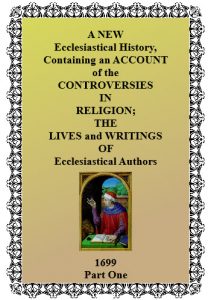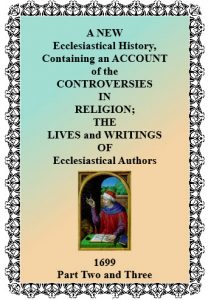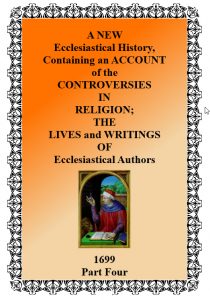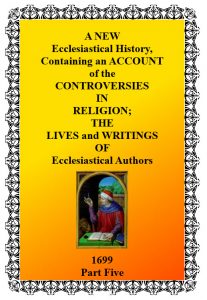- A New Eccl. History 1
- A New Eccl. History 2 & 3
- A New Eccl. History 4
- A new Eccl. History 5
THE TRANSLATOR TO THE READER
AS Monsieur Du Pin has merited the Applause of the Learned World, for his former Volumes of Ecclesiastical History, so in these three which are now published, he continues still to write like himself, and maintain the same Character which has been given of him \ he is no less faithful in his Relations, judicious in his Reflections, exact in his Criticisms, and moderate in his Censures of those who differ from him, and even more impartial than would be expected from one of a contrary Party.
The two first Ages treated of in this Volume, viz.. the 13th and 14th, were covered with some Remains of that Ignorance and Barbarism, which reigned in the last preceding Ages: But this is so far from being any just Prejudice against this History, that it should rather invite the Ingenious Reader’s Curiosity, when he considers, that the excellent Historian has enlightened these dark Ages, by giving a clearer account of them than any one Writer before him, for he has brought to light some notable Pieces of History which seemed to be buried in Oblivion, and collected together the several Fragments which were scattered in many Volumes, and placed them in such a clear light, that the Darkness of the Times serves to set off and commend the Judgment of the Historian.
INNOCENT the Third before he was raised to the Pontifical Dignity, went by the name of Lotharius. He was born at Anagni, being the Son of Thrasimond of the Family the Earls of Signi, and of Claricia a Roman Lady. He studied at Rome, Paris, and Bologn; and being upon his return to Rome, was ordained Sub-deacon by Gregory the 8th, and when he was but 29 years old, was made Chief Deacon by the Title of S. Sergius and S. Bacchius, by Clement the 3rd .
His Learning and Merit made him be unanimously chosen by the Cardinals on the very day of Celestin’s the 3rd’s Death, which happened on the 8th of January 1198; although he was then but very young, and no more than Deacon. He was consecrated Priest the 21st of February the same year, and raised to the Pontifical Throne on the Sunday next after the Feast of the Chair of St. Peter at Antioch.
After having satisfied the People by the ordinary Largesses, and received an Oath of Allegiance from them, he made an Order, forbidding all Officers in the Court of Rome to take any Fee or Gratuity for what should be done at Rome, except the Rights that were due to those who drew up and writ the Bulls, on which he laid a very moderate Impost. Having remedied this Abuse, he applied himself wholly to decide in cases that should be brought before him. Thrice a week he had a public Consistory, where he in person gave Judgment in all principal Causes, leaving the meaner ones to his Commissaries.
This quick dispatch brought him a multitude of Causes from all parts of the world, so that an Author that lived in his time remarks, that he in his Popedom decided more and more weighty Affairs than had ever been decided in thrice the time in the Church of Rome. This was the occasion of his writing such a vast number of Letters, of which there is a Collection divided into nineteen Books according to the years of his Pontificate.
THE great number of Authors which wrote in the Thirteenth Century of the Church, seems to promise a great variety of very diverting matters. And therefore no doubt it will be a surprise to find nothing in this Chapter almost but just the Names, the employments, and the Time of the greatest part of the Authors, with a simple Catalogue of their Writings. But if one considers the nature of the Works, and the manner of their Composition, he must confess that we have used them as we ought, seeing the Extracts that might have been made of them would have been neither useful nor pleasant and therefore we shall content ourselves in making some general Reflections upon the different sorts of Subjects which busied the Authors of the Thirteenth Age, and upon the manner of their writing.
The most considerable are the Commentaries upon the four Books of Sentences of Peter Lornbard Bishop of Paris, whose Work was then in such request, that it was the only Divinity that was taught or learnt in the Schools. But instead of pursuing his Method, and solving the Questions which he has proposed by passages out of the Fathers, they make use of nothing almost but Philosophical Principles, and Metaphysical Niceties: they don’t think it enough to explain the Text of the Book of the Master of the Sentences, but they must take his Questions; and handle them after a different manner.
THE STATE OF THE EASTERN EMPIRE, and of the Greets Church in the Thirteenth Century, was Subject to various Revolutions. The Emperor Isaac Angelus, after he had Reigned Nine Years, was of the Greek dethroned in the Year 1195, by his own Brother Alexius, who took upon him the Sirname of Comnenus, and after he had put out his Brother’s eyes, cast him and his young Son into Prison.
The Son having made his Escape from Constantinople, went into Germany to wait upon his Brother-in-Law the Emperor Philip, by whose advice he made his application to the Army of the Crusade, which was ready to march for the Conquest of the Holy-Land. He desired that before they marched into Palestine, they would reestablished him in Constantinople, and expel the usurper, with all promising afterwards to join forces with them, and to help them to considerable supplies.
This Proposal being made to the Crusade, at their rendezvous at Venice, by the Emperor’s Ambassadors and the Deputies of Alexius, was accepted by the Venetians and French, whose Army marched to, and besieged Constantinople in the Year 1203, and within Eight days took it. Alexius the elder fled by the Bosphorus and the Euxine Sea to Zagora, an Isle of Thrace. Isaac was let at liberty, and reestablished on the Throne with his Son Atexiut. This Prince promised to recognize the Pope, to put an end to the Schism, and to reconcile all his Subjects to the Church of Rome. But not being as yet altogether in a Capacity of performing what he had promised to the Princes of the Crusade, he prevailed upon them to put off their expedition into the Holy-Land till Easter following.



